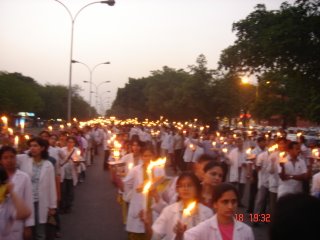If you were to associate this year with something for India, what would it be? Terrorist attacks? Anti-corruption (through
RTI)? The Courts (they are really doing something!)? Strategic partnership with the USA? Or the failure of UPA Government and protests by people and Left parties?
Well, I will call it a year of candles... and of course, candle manufacturers. Confused? Here's why:
We all saw in
Rang De Basanti what happens when Indian Air Force's Lt. Ajay Rathode (R. Madhvan) dies in the crash. People protest, but in a very different way. Everyone goes to
India Gate in Delhi, India and lights up a candle in memory of the pilot, and to protest the government's inaction and declaring the pilot as unfit to fly in the first place.
It showed a way of protesting peacefully : get united and light candles to show your support for the cause.
Well, we always have had electricity problem, and I believe even in Mumbai now. But we always used candles as a source of light when there was no electricity, or darkness for some other reason. Also very important in villages of India. So, the sale of candles was basically dependent only on the power cuts. However, candle sales must have gone up lately, because of the use of candles to protest peacefully. Everyone's following RDB's model now.
Some recent cases:
- Jessica Lall murder case protest: Accused acquitted, court cited the lack of evidence and hostile witnesses. The result was a candle-light protest all over India, specially in Delhi - India Gate jo hai
- Reservations for OBC Protest: Arjun Singh proposes to introduce 27% quota for people belonging to Originally Backward Class (OBC) in addition to the 22.5% already given to the SC/ST backward classes. The result:



Now you see... Candles Candles everywhere
- More recently, people lit candles (picture) to commemorate the victims of the Mumbai blasts and also to condemn the terrorist attacks
- CNN-IBN also started a unique way to help the blast victims. You can go here and "light a candle" virtually, and for every "candle lit", they will donate Re. 1 to the victims.
So, I guess everyone's saying "Rang De Mombatti", or "Jala De Mombatti" (light the candle). Good for the candle companies, isn't it? Now they don't have to rely only on electricity. Rang De Basanti did the magic.
Now more candles ofcourse means better sales for the companies producing these, and more employment... Wait, did I just say employment? That means, it is an unseen effect of a movie, and the "bad" policies of the government too (reservations!). Had there been no reservations issue, no candle protest, and no increase in employment for the poor people. So atleast one good thing UPA did, which was (of-course) unintentional.
Well, don't be so excited, there's a problem too... Paraffin was is a by-product of crude oil, and increase in crude oil and petroleum prices mean the costs for candle industry going up. This would mean that not only you pay higher prices for your petrol (gas), but also your candles! And the high demand of candles also supplements that (Demand-Supply model). So they way it is now, it seems like the demand for candles will increase significantly, while supply won't (because of crude oil crisis), which will lead to high prices of candles. Now this could mean, either the government importing candles, just like they are importing wheat etc, or Indian people going back to the "ignorant stage of life" (a new one - this replaces the other four stages of life of Hinduism), where they don't light candles and don't protest - which, by the way, is definitely more likely. India has a shortage of electricity, so they definitely won't use bulbs there to protest, rather they won't protest at all. Well, how about a torchlight? Oh that would mean a bad diwali... expensive one :(
Slowly, the demand will decrease, and there will be equilibrium - the demand will depend only on electricity, and not on issues like reservation and Jessica Lall case. Now if people stop protesting and the UPA government again starts taking bad decisions like reservations, people won't protest, which would mean, it will go through easily. The state of the nation will be so bad, that people will start realizing they will have to do something before the government takes India back to 1800s. They will again! come out with candles because by then, the candles will again be affordable, and it will all start over - protests, candles etc... all of it...
Sounds interesting right? That's the real future of India ;-)
Conclusion: We just entered a vicious cycle - of candle protests and ignorant stage of people in India
Assumptions made:
- Crude Oil prices will remain high ... Oh wait, that's not an assumption, that's a fact
- Traditional ways to making candles will be followed, and no alternative fuel like Hydrogen etc will be invented to make candles more efficient in the near future





